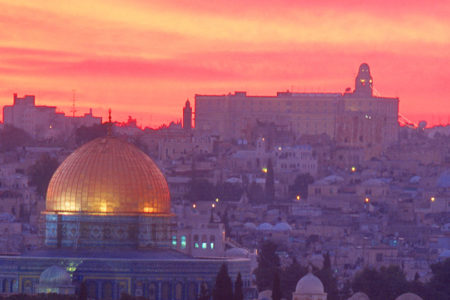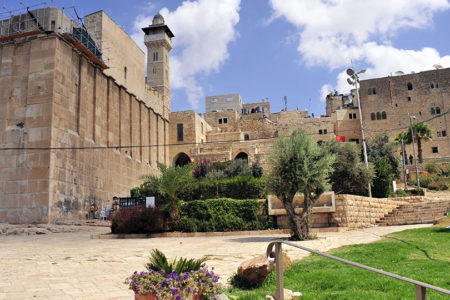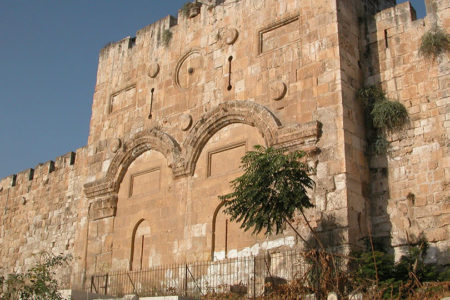The Church Confronted And Comforted Revelation 2:1–11
“Churches are like people. No two are alike. Each has its own personality … size and shape … strength and weakness,” wrote Steven Lawson.* This is evident when reading Christ’s letters to the seven churches in Revelation. Each letter is tailored to speak to the need of the church addressed.
“While John was on the isle of Patmos, Christ commanded him to record seven messages to specific churches in Asia Minor. These letters are recorded in chapters 2–3 of Revelation and make up the second division of the book, identified as “the things which are” (1:19).
Why were these seven churches chosen over others? Possibly because of their geographic locations. They were linked by a circular road that connected the most populous parts of the province; therefore, the letters were probably circulated to other churches within the province.
Most likely these churches provided a complete picture of the spiritual conditions common to churches in John’s day and throughout history. Scholars have held various interpretations regarding the meaning of these seven churches. Primarily, the messages were given to seven literal churches existing in John’s day; however, they portray seven different types of churches that have existed throughout church history. Some, like Ephesus, have left their first love for the Lord. Others, like Sardis, are spiritually dead or, like Laodicea, lukewarm at best. The same can be said of individual Christians. These letters contain warnings and counsel for every generation of believers.
Many Bible scholars assign prophetic meanings to these seven churches and their order in the narrative. Some teach a providential arrangement of the churches corresponding to the chronological development of seven stages of church history. While many parallels do exist throughout church history, there is a lack of scriptural support for this interpretation. Every period of church history has experienced the strengths and weaknesses that characterized these churches.
The message of each letter is structured in a set pattern: (1) the church and city are identified; (2) Christ’s character is revealed; (3) the church is commended (except Sardis and Laodicea); (4) compromise is condemned (except Smyrna and Philadelphia); (5) the church is counseled; (6) there is a call to commitment; and (7) compensation is promised to overcomers.
Ephesus: The Loveless Church
Ephesus was one of the oldest and largest cities in Asia. During the first century it was a major city in the Roman province of Asia Minor. It was the crossroads of civilization in that day, noted for its great library, opulence, and wealth. Politically, it was a free city and home to the Roman governor of the province. Ephesus was located on the Cayster River, three miles from the Aegean Sea, and had a major harbor where ships could unload their cargo. Caravan routes from cities in the north, south, and east converged in Ephesus, making it a leading commercial center.
Religiously, the Ephesians worshipped Diana, the goddess of the woodlands and fertility, among other things (Gr. Artemis). The temple of Diana was one of the wonders of the world, dating back to the sixth century BC, and religious prostitution and orgies flourished in that temple.
Paul founded the church at Ephesus, where he spent three years preaching and teaching, and it became a missionary center from which all of Asia heard the gospel (Acts 19:8–10).
Christ directed His letter to “the angel [messenger] of the church of Ephesus” (v. 1). The word messenger refers to the pastor who, with the other six pastors, was said to be in the Lord’s “right hand” (v. 1), a symbol of His authority and power. The Lord protected, controlled, and cared for these men and held them accountable for their ministry. Jesus “walketh in the midst of the seven golden lampstands [churches]” (v. 1) and was mindful of their spiritual condition.
The Lord commended the church in four ways. First, He mentioned their devotion in service: “I know thy works, and thy labor, and thy patience” (v. 2). Second, He commended their deeds of righteousness: “and how thou canst not bear them who are evil” (v. 2). This church did not tolerate sin; they hated the “deeds of the Nicolaitans” (v. 6), which many believe was a cult that professed faith in Christ but taught anti-nomianism and practiced licentious living. Third, He lauded their doctrinal soundness. False apostles were not tolerated within the church (v. 2). Fourth, He recognized their diligence under testing: “for my name’s sake hast labored, and hast not fainted” (v. 3). The church was separated from evil and sacrificially worked for the Lord with a servant’s spirit.
But the Lord also had a complaint against this church: “Nevertheless, I have somewhat against thee, because thou hast left thy first love” (v. 4). Notice that they did not lose but left (forsook) their first love for the Lord. The Ephesians had once possessed an agape (spiritual, self-giving) love for the Lord and others, but their devotion to Christ had severely eroded. He had their heads and hands, but not their hearts. When love for Christ cools, labor done in the name of the Lord can become self-centered and lead to compromise and spiritual corruption.
In verse 5 the Lord counseled them concerning their condition. First, He said, “Remember, therefore, from where thou art fallen.” They were to recall their past commitment and reevaluate their present compromise. Second, they were to repent of their sins with contrite hearts. Third, they were to repeat their “first works” that is, serve Christ with a burning heart of love, spending time in fellowship, study, worship, and prayer. Fourth, their refusal to repent would cause their removal: “or else I will … remove thy lampstand out of its place.” (v. 5). Loveless churches eventually lose their ability to shine in a lost world. The Ephesian church closed in the fifth century. Sad to say, many churches functioning today possess neither love nor light for a lost world.
Compensation was promised to overcomers: “To him that overcometh will I give to eat of the tree of life, which is in the midst of the paradise of God” (v. 7). The word overcomer does not refer to Christians who have gained some spiritual victories in life, but to those who have accepted Christ as Savior (cf. 1 Jn. 5:45). True believers are assured of eternal life; they will “eat of the tree of life” first mentioned in the Garden of Eden (Gen. 2:9) and now in heaven. Those who eat of the tree will live forever (Gen. 3:22).
Smyrna: The Suffering Church
Smyrna, only 35 miles from Ephesus, was a wealthy city that rivaled Ephesus in beauty and commerce. It had well-planned harbors and a beautiful countryside surrounded by seven hills, but it was filled with the pagan temples of Apollo, Asclepia, Aphrodite, Cybelle, Emperor Tiberius, and Zeus. Although it was a free city, it gave full allegiance to the Roman Empire. Smyrna was destroyed in the seventh century BC and rebuilt by Alexander the Great in the third century BC. It was famous for its superb school of medicine.
Scripture is silent on the establishment of the church at Smyrna, but it was most likely begun by the Ephesian church.
Christ identified Himself to this church as “the first and the last, who was dead, and is alive” (v. 8). Smyrna means myrrh or bitterness, a sweet perfume used for embalming the dead—an appropriate picture of Christ’s suffering and death. Knowledge of the Lord’s suffering was a great comfort to the believers at Smyrna, who were undergoing horrible persecution.
There was no condemnation for this church, only commendation. Christ knew their “works, and tribulation, and poverty” (v. 9). Politically, they suffered persecution from the Roman Empire. Physically, they were fed to lions, crucified, killed by wild dogs, tarred, burned at the stake, and boiled in oil. The famous Polycarp, Bishop of Smyrna, was burned at the stake in the arena at Rome around AD 155. Economically, they suffered abject poverty as a result of their uncompromising commitment to Christ. They were most likely denied employment, Christian shop owners were boycotted, and their homes robbed and vandalized. The Lord could easily relate to their poverty (2 Cor. 8:9). Yet they were rich (v. 9) in Christ’s love, scriptural encouragement, spiritual blessings, and the fruit of the Spirit. Paul’s testimony provides a good summary of what the Christians in Smyrna were experiencing: “as poor, yet making many rich; as having nothing, and yet possessing all things” (2 Cor. 6:10).
Religiously, many in the Jewish community were being used by Satan to blaspheme this church and the Lord. Christ said, “I know the blasphemy of them who say they are Jews, and are not, but are the synagogue of Satan” (v. 9). They were Jews by birth, but not by faith—motivated by Satan to persecute and slander the church.
Satanic persecution caused some of the Smyrna believers to be imprisoned. They were “tried, and … [had] tribulation ten days” (v. 10). Commentators hold three positions on this subject: ten literal days of persecution for believers in Smyrna; ten major Roman persecutions for the first 250 years of the church; or a ten-year persecution through Diocletian. The first position is most likely correct.
The Lord counseled the church not to fear the things they would suffer (v. 10). He assured them that He was in complete control of their circumstances. As with Job, God sets limits on what Satan can do to believers. He will not let them be tried beyond what they are able to bear (1 Cor. 10:13), and His grace is sufficient to carry them through any trial (2 Cor. 12:9).
A crown was promised to those who remained faithful: “I will give thee a crown of life” (v. 10). This is the martyr’s crown, given to those who are “faithful unto death” (v. 10). Again, John called on the believers to “hear what the Spirit saith unto the churches” (v. 11). The overcomer “shall not be hurt of the second death” (v. 11); that is, no true believer will have to stand before the Great White Throne Judgment and be condemned to the Lake of Fire, which is the second death (Rev. 20:11–15).
The Christians in Smyrna underwent crushing persecution, but throughout their experience they emitted the fragrance of Christ. Poor though they were, they were rich in spiritual blessings. Because of their faithful commitment to Christ, this church lived a victorious life. Christians today who are undergoing trials for their faith can glean encouragement, strength, and comfort from the testimony of this church.
Finally, the readers are challenged to take this message to heart: “He that hath an ear, let him hear what the Spirit saith unto the churches” (2:7, 11).







